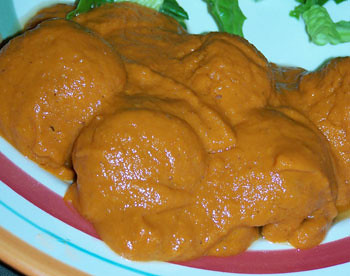
You know about raw foods, I know about raw foods, and we both know people who know about raw foods. It seems like more and more people know about this lifestyle than ever before -- and that's absolutely true! But, it's still true that, on the whole, the average person on the street knows almost nothing about it. As such, if you're a raw foodist, you often find yourself in situations in which you're explaining it to people. (Obviously, as raw foods bloggers, we're more than happy to do so, of course!)
Amid all of these explanations to new friends and new readers, it's not too uncommon to hear people scoff at the idea in one way or another. Common objections include things like:
As you read this, calming violins open a familiar tune and that sweet mellifluous voice of Etta James soon enters your mind: "At laaaaaaaaassssst. My looooove has come along....." Great tune, right ! Well, it's appropriate here because, at LAST, here's the long-awaited Episode #9 of Know Your Food! That's right, friends, today we're going to explore the wondrous FIG in all of its sweet, soothing glory. One taste and happiness blossoms within you, washing over your entire being... We only wish that the following video was as professionally rendered as this paragraph of evocative prose... (but, we promise we'll get there one day).
In case you missed the actual nutrition info in that video (what little there was, LOL), here's the transcript:
This isn't one of our normal blog posts. It's more of a journal entry, than anything else.
You see, I'm a bit sad today. The Raw Spirit Festival in Santa Barbara, CA, started today and I'm not there. We've been working really hard on many raw food projects, trying to sell our home, etc. So, spending the time and money to travel to the other side of the country for a weekend event just didn't seem like a good idea.I don't think we made the wrong decision, but I do admit I was hoping that somehow the Universe would conspire in some magical way to arrange for me to attend the festival this weekend.
For those who have never been to a Raw Spirit Festival, you might wish that you could attend something so totally awesome---to be surrounded by raw foodies you've met online, to attend the various speeches and events at the festival, etc.---but you probably aren't feeling completely sad that you aren't there. To have attended a Raw Spirit Festival, had your entire life altered by the experience, and then to not attend the next one is almost heartbreakingly sad.
"Should you eat when you're not hungry "
That was a question I asked myself a lot when I was first transitioning to the raw food diet. Just about everything I ever read said that people shouldn't eat if they aren't hungry. We need to listen to what our bodies are telling us in order to be as healthy as possible.
What if your body is telling you it's not hungry, however, while your instinct is telling you that you still need to eat That's what was happening to me in the beginning of my raw journey. My digestion was very slow and food would sit in my stomach for most of the day, especially if the food I ate was processed or heavy. It didn't matter how much I ate, either. My portions were always very small compared to those that my fit-looking friends were eating. I always wondered how I was the obese one when my meals were so minimal in comparison.
Read more: Inner Guidance: Should You Eat When You're Not Hungry?
The other day I made a recipe from "Rainbow Green, Live-Food Cuisine" by Dr. Gabriel Cousens. I modified his recipe a bit and what resulted was amazing. Perhaps the original recipe tasted even better, but this is what I did with it.


It's time for another "Makin' It Monday" installment!? This time, Pittsburgh raw foodies Joe Prostko and Tracey Anne Miller (along with videographer Heather) demonstrate their "Turbo Tornado Superfood Solution," which has (as you'll see) a *ton* of superfood ingredients. Take a look:
Read more: Makin' It Monday: Turbo Tornado Superfood Solution

Greetings, everyone! ?We've been away from regular blogging for what seems an *eternity*. When we left the airwaves, the raw food world was at total peace with itself -- bliss, harmony, sister- and brotherhood. Aside from rare, gentle disagreements among raw vegans on issues such as whether raw chocolate was mineral-rich or potentially taxing to your body's store of minerals, things were pretty much business as usual.
And then we moved away and took a little time off to regroup .. ?and NOW look at the state of the raw food zeitgeist: (1) long-term raw foodists just about everyhwere are now "eating a little bit of cooked food," (2) an enormous schism has emerged after the seemingly improbable development of many long-term vegans returning to meat eating, (3) informational summits and online meetings have been replaced by debates, and (4) let's face it, the supplements being discussed and sold are getting, well, much *weirder* than ever!

Wow, is it Friday already !? Time flies when you're powered by 100% raw organic goodness! Today, we wanted to share an audio interview with you. Last night, Alex Ortner from the Movement to Reverse Diabetes Naturally interviewed us about our recent work helping them spread their message. We were honored to hear him introduce us as "two people that hold a special place in my heart right now, and I'll tell you why that is: They are probably the two most active people that we've had in the movement to reverse diabetes naturally."
Well, Alex, it was our pleasure! We met scores of new people during our work for RDN, generated major awareness about the movement, and spread the word about the raw food lifestyle as well. To listen to or download the interview, just visit their site, here. Topics covered include:

Hi there, Pure Jeevan family! ?Jim here... A few weeks ago, I'd been reading about Bibi McGill, the guitarist and musical director for Beyonce. It was a fascinating piece (linked to below, actually) and, to my complete surprise at the time, touched on her fairly serious interest in raw foods -- and, wouldn't you know, she also lives right here in sunny Portlandia!
Soon, I realized that I'd seen her name around town before -- and Wendi did, too! There are these absolutely addictive kale chips, you see... (We like to get them at our local food co-op from time to time because they're truly something special.) ?But, until recently, we didn't piece it all together -- that one person manages to produce this distinctive brand of raw snacks, teach yoga classes here in Stumptown, AND somehow also tour the entire globe as lead guitarist ?for world-class acts like Beyonce and Pink!

Today, for Thankful Thursday, I want to focus on a raw food related subject: Raw Recipe Books! Without the many mouthwatering, visually appetizing recipes that have been created and published, I don't know if I'd still be living a raw food lifestyle at this time.
About two years ago, when I made the decision to transition into a raw food diet, there were some fantastic raw food recipe books available. A few years before that, when I tried raw for the first time with a dear friend of mine, there were books available but none of them were truly gourmet meals. It's amazing how much things change in just a few years! The newer books are filled with colorful pictures of the most visually stimulating foods, which never looked like simple chopped up veggies arranged nicely on a plate. We have a page with many raw recipe books listed, if you'd like to see some of the ones that are available.


Today for "Take the Time Tuesday," we'd like you to take the time to meet Mimi Kirk, whom many of you may know as the winner of PETA's "Sexiest Vegetarian Over 50" contest last fall. If you're interested in longevity, and how diet influences the way we look, act, think, and exist, then you'll definitely want to listen closely to what this vibrant woman, who is 71 years young, has to say. We spoke with Mimi for nearly an hour this weekend, and are happy to share her inspiring interview with all of you. Below, you can listen right here, or download a podcast MP3 version.
